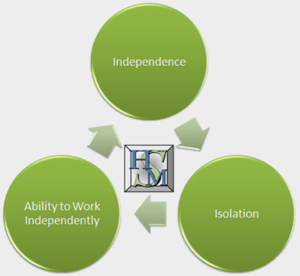Have a great Labor Day weekend!
August 29, 2013Interpreting Survey Results Accurately
September 5, 2013Independence vs. Isolation vs. Ability to Work Independently
“Working from home” is often high on the wishlist of traditional office-workers. The independence to work when we feel like, the flexibility to manage time to suit our convenience, extra time we can possibly give ourselves or our loved ones, or not having a boss to deal with on a daily basis — there are a number of reasons why working from home is aspirational for many. The grass almost always looks greener on the other side of the fence.
What most don’t realize is that working from home has its own challenges and requirements. As an organization that employs a number of work at-home employees, we have seen some of our team members face these challenges. Especially in the early days of starting to working from home. This article will address three seemingly synonymous challenges of working from home — Independence, Isolation and the Ability to Work Independently.
Independence
 Ask someone why they want to work from home and independence is likely to be among the top five reasons you get — if not the top reason. There’s no denying the fact that working from home can lead to independence — from the commute, fixed hours, traffic jams, and more. It can even result in saving cost, free up time and get you that extra time you couldn’t give your family while working from an outside office.
Ask someone why they want to work from home and independence is likely to be among the top five reasons you get — if not the top reason. There’s no denying the fact that working from home can lead to independence — from the commute, fixed hours, traffic jams, and more. It can even result in saving cost, free up time and get you that extra time you couldn’t give your family while working from an outside office.
However, there’s no such thing as a free meal and this independence comes at a price. Most jobs have fixed hours whether you work from home or office, so all you may really be saving is the commute. Many jobs require you to collaborate with colleagues, the boss or clients — so the independence from people may be a far fetched notion.
Independence doesn’t mean lack of discipline.
Over years, we have tracked the reasons for employee turnover. Not surprisingly, we found that lack of interest or ability wasn’t even close to being a major reason for losing employees. We found that 88% of the people that do not remain on board at HMS miss between 1 and 3 days of work within the first 30 days! In most cases, these employees start with the wrong presumption that they can work when they want , if they want.
Our article about the self-discipline needed to work successfully from home talks at length about the need for discipline while working from home.
So how is independence a challenge for someone that works at home? When a person has certain expectations and notions of what the independence would mean, and when the reality doesn’t entirely match the fantasy, it’s bound to cause frustration. You could end up feeling cheated, the stress levels could go up, life can seem even more chaotic and a person can begin to miss the comfort and predictability of an office job.
Isolation
Most people do not realize how big a challenge isolation can be while working from home. We tend to take many small things for granted — like hallway conversations, a joke shared with a colleague across the desk, parking lot greetings, coffe breaks with colleagues, and more. The absence of these things while working from home can add to the isolation.
Group dynamics of an office that contributes to productivity and atmosphere no longer operate when you work from home. Very soon, a person can feel lonely, isolated and cut off from the rest of the organization. Lack of discipline can begin to creep in, domestic distractions become escape routes, and before you realize performance begins to slide. It becomes a spiraling effect where one thing leads to another, hurting morale, spirit, self-confidence and more. In extreme cases, it can even spill over to domestic life making the person snappy, irritable, etc. Before deciding on working from home, a person needs to be aware of these dangers and challenges posed by isolation. It’s important to have corrective measures in place.
At HMS, we try to minimize the impact of isolation through conference calls, meetings, in person events, instant messengers for one-on-one and group chats, etc. Any organization that employes at-home employees needs to take these measures to minimize employee isolation. However, every individual also needs to be aware of these challenges and should take personal measures to minimize the feeling of being isolated.
Ability to Work Independently
The ability to work independently isn’t quite the same as either independence or isolation. Just because a person is skilled it doesn’t automatically give the person the ability to work independently. A few qualities that a person may need to work independently include:
- The ability to thinking on ones feet
- Ability to make the right decisions — without having to consult a boss or colleague-and knowing when to consult upper management
- Instinctively knowing when to escalate something, when to request a review, when to consult someone
- Ability to stay disciplined and motivated without being monitored and complete projects by deadlines.
- Time management abilities
Most people judge their ability to work independently by how they performed in an office environment. The dynamics of working from home aren’t always the same and even the best can sometimes struggle.
Work from home at HMS
The pit-falls of working from home aren’t insurmountable. There are measures you can take, and your employer can facilitate that will not only make it easier to work from home, but also help you develop the skills and attitudes necessary for succeeding as an at-home worker.
HMS has been employing and training at work at home team members for many years. Our processes and best practices have helped many of our employees build successful careers from the comfort of their home. Join the growing team of at-home employees at HMS!
